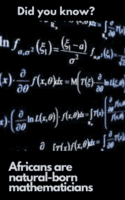African people are fascinating and diverse, from ancient times until, today and will be for generations to come. The diversity and uniqueness found in Africans and Africa is one that leaves an interesting taste on the palate. Equally enchanting, is the manner with which African people have chosen to fashion and live life. Beliefs, traditions, norms, food, traditional regalia and the rites of passage of African people are synonymous with a signature song and dance and the occasional ululation.
The magic inside of us
The study of humans and how they show expression to their ideals and origins is often filled with the most profoundness. Take Thulisile Bhuda for instance, a PhD candidate at the North West University majoring in cosmology and enthnomathematics. She argues and proves through her sought after dissertation that Ndebele people are ethnomathematicians by birth and that they use geometry in their bead work without having had gone through formal education. Magical, isn’t it?
Bhuda submits that, African people by birth and by design are intrinsically scholars, mathematicians, astrologists and much, much more. She extends that African people are of the cosmos and the stars and can speak to the elements and the elements respond. Similarly, African people have incorporated wildlife and nature in its entirety in their DNA and identity through clan names, totems, months of the year, seasons, idioms, names, surnames and the like.
What is ethnomathematics
Ethnomathematics is the relationship between culture and mathematics. Thulisile’s work focuses on mathematical ideas and concepts with African indigenous societies. She proves that African people are ethnomathematicians and scientists who were taught indigenous education.
They have knowledge of mathematics that was never acquired through formal education. Her work further proves that African people have been taught through indigenous education where they participate, observe, experience and gain knowledge orally.
“We need to remind ourselves who we were before colonisation,” she says.
The story behind the story
Born Thulisile Bhuda in Kwaggafontein – KwaNdebele, she is a sister and a daughter raised by matriarchs of her home – her mother and maternal grandmother. She received her elementary and formative education in Kwaggafontein and upon matriculating set sail for North West University – and so her Indigenous Knowledge Systems career ensued.
In the year 2013 she enrolled for a Bachelor’s degree in Indigenous Knowledge Systems and this would be her first formal introduction to the course that would inform the trajectory of her life. After obtaining her degree she applied and was accepted to do a Master’s degree in Indigenous Knowledge Systems, which she completed. It seemed the bug had hit and its sting was long lasting as she in recent times can be found in research units of her institution where she is now doing her PhD still in Indigenous Knowledge Systems.
“As an indigenous scholar, I have the passion and duty to preserve, protect and disseminate African culture and its vast heritage; that is why I major in ethnomathematics and African cosmology.”
The work of re-education and preservation
Thulisile’s work also focuses on re-educating and re-introducing the African child to the beauty and dynamics of the clicks, twists and turns found in the palates of indigenous people and how those need to be preserved for future generations to benefit from. As a lecturer, she has found a space to whisper truth to power by using isiNdebele inside the classroom with her learners who are as eager to learn more about Africans and African cultures. Lest though we forget who we really are.
We need to own our identity and acknowledge, as Africans, the knowledge of those who came before us and worked hard to preserve and protect our indigenous knowledge. We have so many indigenous scholars who are now writing about their own knowledge and telling the story of African people. Indigenous scholars are reclaiming what has been lost. It will take time but it will eventually happen.
***
Ever wondered about the difference between astrology and astronomy? Find out more here
Tell us: Do you think it’s important to own our identity as African people?

